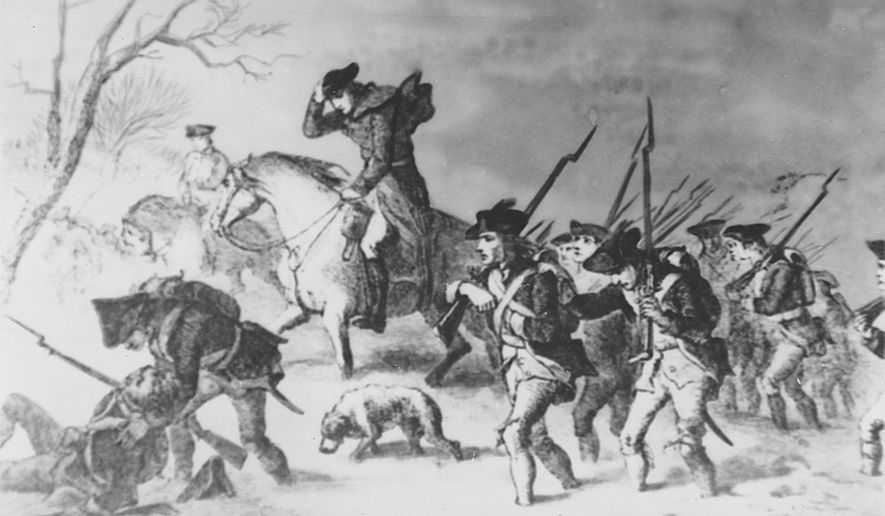OPINION:
As we careen toward the final July Fourth before the quarter-millennial celebration of the Declaration of Independence from George III — and before we get carried away by all the high-minded rhetoric about freedom and liberty — it might be worthwhile to think about the actual cost of the Revolution paid by those who fought it.
At the Battle of Bunker Hill on June 17, 1775, 115 Americans died on or near the battlefield. Another 30 were taken prisoner, 20 of whom subsequently died. Among the dead was Joseph Warren, an early leader of the Revolution in Boston, an incendiary orator and a skilled doctor. Warren recruited Paul Revere and William Dawes to make the midnight ride to Lexington and Concord on the evening of April 18, 1775.
After the Battle of Bunker Hill, Warren’s body was stripped of clothing, repeatedly bayoneted and then tossed into a shallow ditch by the British. That sort of thing was not uncommon during the Revolution. Because it was a civil war, it was particularly awful.
How about those who signed the Declaration? Surely, they were insulated by money and power? Not really.
Of the 56 original signers, 17 fought in the war. Thomas Nelson commanded Virginia’s militia at the Battle of Yorktown. William Whipple served with the New Hampshire militia and was a commanding officer in the campaign that led to the British surrender at Saratoga in 1777. Oliver Wolcott commanded the Connecticut militia that took part in the Saratoga campaign. Caesar Rodney was a major general in the Delaware militia. John Hancock was a general in the Massachusetts militia.
The British captured five signers during the war. Edward Rutledge, Thomas Heyward and Arthur Middleton were captured at the Battle of Charleston in 1780 and spent the remainder of the war in pestilential St. Augustine. George Walton was wounded and captured at the Battle of Savannah. Richard Stockton of New Jersey never recovered from his incarceration at the hands of the British and their Tory allies. He died in 1781.
Thomas McKean of Delaware wrote John Adams that he was “hunted like a fox by the enemy — compelled to remove my family five times in a few months.” Abraham Clark of New Jersey had two of his sons captured by the British during the war. John Witherspoon’s eldest son lost his life during the Battle of Germantown.
The British destroyed homes and property. Francis Lewis’ New York home was razed, and his wife was taken prisoner. John Hart’s farm and mills were destroyed when the British invaded New Jersey. He died while fleeing capture. Josiah Bartlett’s and William Ellery’s residences were burned to the ground. Carter Braxton and Nelson, both of Virginia, like many other well-off revolutionaries, gave some or all of their fortunes to support the war effort. They were, of course, never repaid.
Thomas Jefferson was forced to flee for his life when the British, under Gen. Benedict Arnold, invaded Virginia. George Washington, who was not a signer, was, of course, subject to more violence during the war than almost anyone else.
As many as 27,000 Americans died during the Revolution: about 6,800 during combat, another 10,000 from disease and malnutrition in camp, and, most grisly, 8,500 perished after being taken prisoner. That is about 1% of the total population of the Colonies in 1776, or the equivalent of 3 million Americans now. It is impossible to imagine that present-day Americans could withstand casualties at that rate owing to any cause.
We are going to spend much of the next year or so suffering through speeches about the fight for independence and the heroism of the Americans and whatnot.
Let’s strip off some of the varnish. Men died in their doorways, and they died far from home. They died under bushes, and they bled to death in the arms of their compatriots. They died from disease in the camps and prisons. Still, they thought all the death and injury and illness were worth it. They didn’t want to be ruled by a single man or a distant, indifferent legislature. Despite all the talk about taxation without representation, the core of the American Revolution was that the rebels didn’t want to be told where to go or what to do by anyone.
Can we say the same thing now, and could we maintain it with the same commitment and intensity in the face of violence or, worse, in the face of an ever-expansive federal government? What, finally, are we willing to fight for?
• Michael McKenna is a contributing editor at The Washington Times.




Please read our comment policy before commenting.